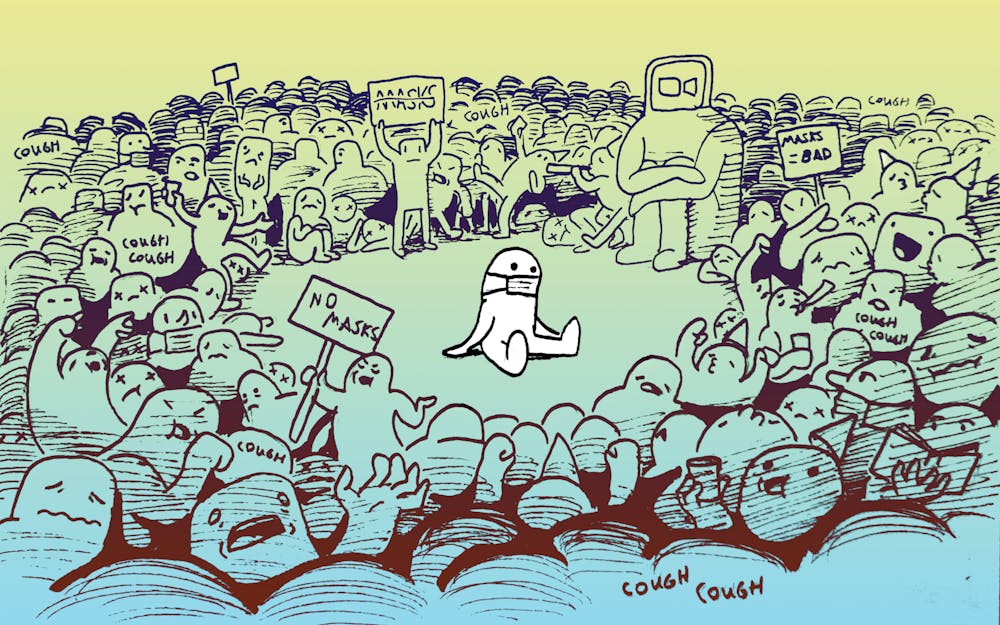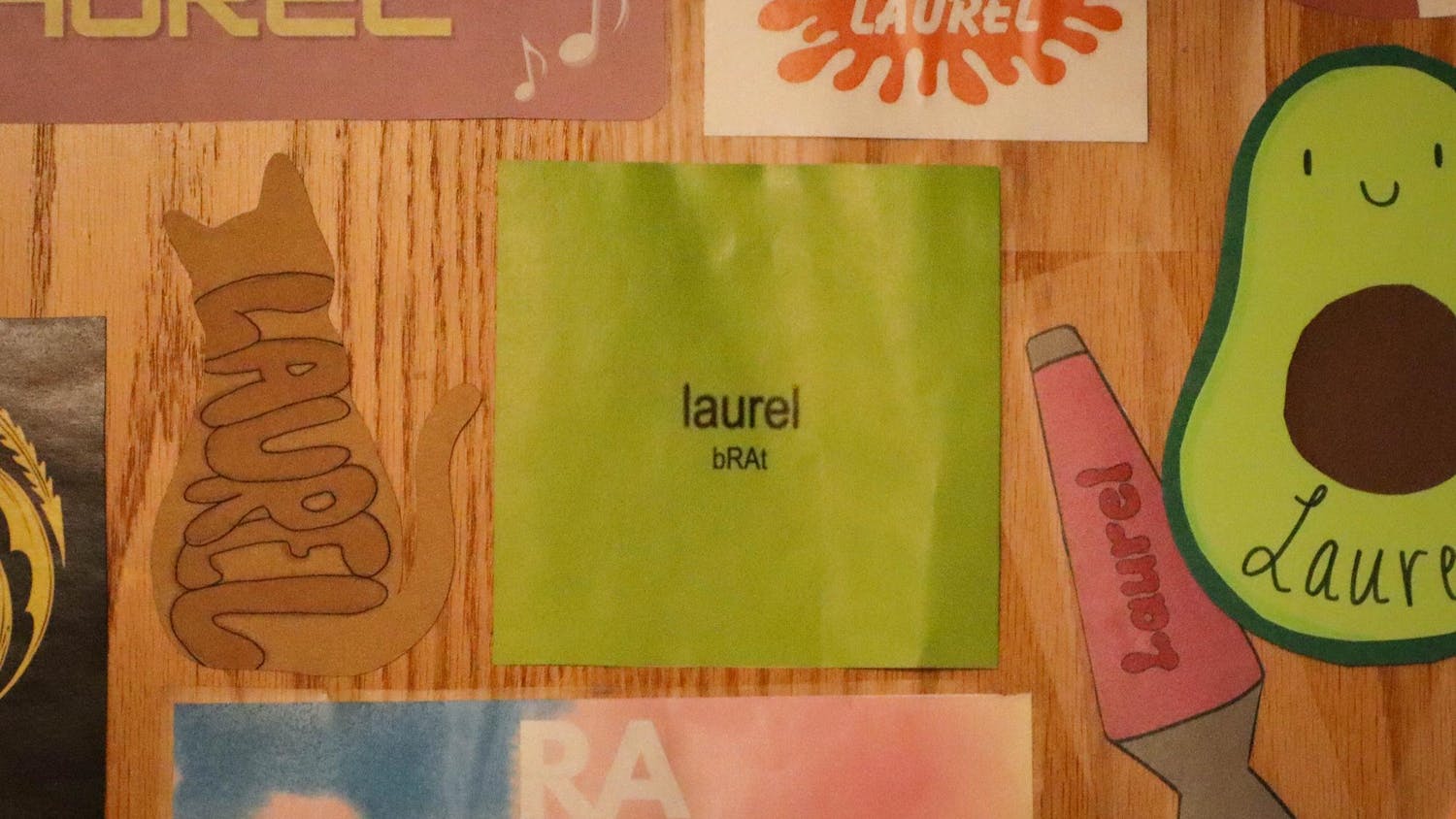Junior William Strum lived in his IU apartment for just more than a week.
When Strum spent time outside, he saw crowds of people walking up and down Kirkwood Avenue and members of greek life not wearing masks and breaking COVID-19 rules.
“I just packed up as much as I could from my apartment and I flew back to Dallas because I figured that it wasn't going to get better,” Strum said. “I just personally never felt safe.”
Strum has type 1 diabetes and said he wanted to stay home in Texas in case he became sick. He said it would be difficult if his parents had to come up to care for him or he would have to take care of himself. He decided to move back home preemptively to minimize that risk.
“Even if it's safe for like four or five people to get together, it's safe enough for them. I still feel a little bit anxious, a little bit of dread,” Strum said. “There's a baseline of anxiety, but I feel like mine is heightened.”
Immunocompromised students coming back to IU during the COVID-19 pandemic are at greater risk of developing a serious case of the coronavirus while living in a highly concentrated area. Their ever-present health challenges are escalated to a new level of risk as COVID-19 fear and protocols begin to relax.
“It’s like tying one hand behind their back,” said Thomas Duszynski, Indiana University-Purdue University Indianapolis’s epidemiology education director. “They are at a disadvantage.”
Duszynski said the risk of catching the virus is the same for everyone. However, there is greater risk for immunocompromised individuals to develop more serious outcomes from it. When an immunocompromised person catches COVID-19, their body may have a delayed protective response to the virus, allowing the disease to progress further.
Since COVID-19 is a new virus, it is more dangerous than the flu. Unlike the flu or a cold, Duszynski said the coronavirus is harder to treat since there aren’t any already-known treatments or medicines to fight against it.
The most important thing is that people continue to wear masks, socially distance and wash their hands, Duszynski said. He said students should know their actions can affect a much larger group of people than they realize.
“It’s about protecting the most vulnerable in the community,” Duszynski said.
Shirley Stumpner, IU Disability Services for Students director, said her office helps find academic accommodations that suit each student on a case-by-case basis. The office cannot change a class’s method of instruction but can help a student find a class that fits the level of in-person contact they desire. The office can also help if students with disabilities need extended time or flexible attendance.
A student should contact the specific department if further non-academic accommodations are needed, such as Residential Programs and Services for a single room or air conditioner. Stumpner said her office has had an influx of students who needed help as a result of the pandemic.
Stumpner said she knows there are students who haven’t returned in fear of COVID-19, but the university is doing a lot to make classes accessible for everyone. She said the COVID-19 rules are universal since they protect all students, not just the immunocompromised.
“The university really is doing a lot, that is an advantage for students that are immunocompromised,” Stumpner said. “They've put in place these things that really are protections for all students and a strong protection for those students who are more compromised.”
Stumpner said students with medical conditions are more likely to be isolated during this time and Counseling and Psychological Services has many services to help with issues such as anxiety and depression. CAPS’s chronic Illness support group is free and aimed to help students talk about their illnesses.
Students have come back to campus while state and national COVID-19 protocols are relaxing and people are attempting to return to normal life amid a still-spreading pandemic. IU has had 1,823 total COVID-19 cases from mitigation testing, quarantined multiple greek houses for weeks at a time and moved infected students to Ashton Center.
Immunocompromised students are isolated from friends and classmates. Others with at-risk people in their lives are worrying about their actions and who they come in contact with on a daily basis.
Strum has gotten seriously ill from the flu in high school to the point where his throat swelled up, he had a high fever and could not turn his head. He also said it was difficult to control his blood sugar until he was completely healthy again. Just a few people not following precautions could put him at immense risk.
“If I get sick through an asymptomatic spreader that could put me in the hospital for a long time,” Strum said. “[Bloomington] was just a very stressful environment.”
Even though his classes are all online, Strum didn’t want to go home. He said leaving has taken a mental toll, not being able to regularly see friends in person and mostly communicating through Snapchat and FaceTime. He feels secluded and like he’s missing out.
Strum said he hopes IU will take more steps to make it safer for students to stay in Bloomington. He said testing isn’t enough to control the social factors that spread the virus, such as off-campus parties like the viral student boat party on Monroe Lake.
“It just takes the actions of a few to derail the lives of the many,” Strum said.
He said he wished IU would have smaller, compounding punishments for students who break COVID-19 policies instead of larger suspensions. He said this could push students toward safer social interactions without punishing them harshly enough that they don’t want to report themselves or others. IU policies include barring gatherings of more than 15 people and mandatory mask use on campus.
“They've kind of forced it to where if you get caught, there's all these horrible penalties,” Strum said. “Students are just not telling people that they're sick or they're just being more furtive about things.”
Sophomore Heather Fields has ulcerative colitis but caught COVID-19 over the summer. Before having the coronavirus, she said she was anxious about how serious her symptoms could be but felt calmer when she only had a mild cold and a slight fever. She has since recovered.
Fields said she is becoming more concerned because her immunity period is over so she is now available for mitigation testing. IU gave her a three-month exemption from testing due to her previous positive test result. She said she doesn’t know about the long-term effects COVID-19 could have but she is doing her best to stay healthy.
“I'm a little bit more nervous now about my immunity period according to IU being up and getting it again,” Fields said.
IU has targeted greek life through mitigation testing or urging students out of houses and off campus. She said she was frustrated with IU when it wanted to have all students move out of greek houses. The stress of not knowing whether or not she could stay in her house or if her chapter would have to quarantine pushed her to move into an apartment, she said.
Fields feels safe in her classes and campus buildings but said if she was to catch the virus again, it would probably be out at restaurants or other places in Bloomington.
Fields said people wouldn’t know by her appearance that she is immunocompromised and there are more students like her on campus with “invisible illnesses.”
“It's important to respect if somebody would ever tell you that they're immunocompromised or are not comfortable with you doing things or going certain places,” Fields said.
Dylan Phillips is a freshman who drives home to Lafayette, Indiana, every weekend to help his mother, who is both immunocompromised and pregnant, take care of his siblings. A close friend’s relative is also immunocompromised.
Phillips goes to campus twice a week for his two in-person classes. He said he is nervous about going on campus since he doesn’t know whether his classmates are spending their free time partying.
He sought out the most protective N95 mask he could find for when he does go out in public. He said he keeps most of his food inside his dorm room so he can avoid the dining halls.
“It makes me very nervous because I'm the guardian of my five siblings so it makes me even more nervous if I touch anything or if my mother touches anything,” Phillips said. “It has been a rough adjustment."
Phillips said he had issues living in Forest Quad when his past roommate developed COVID-19 symptoms and didn’t plan on getting tested. He had trouble contacting his RPS administrator to move to a single room. Phillips said he was told there was nothing they could do to help him and wasn’t able to move until his mother finally got involved.
“I was definitely worried but annoyed at the same time due to other students moving rooms,” Phillips said. “I knew of three or four other students who were able to move with no problems.”
IU is doing its best juggling everything to keep everyone safe, but he thinks there can definitely be more precautions implemented, Phillips said.




